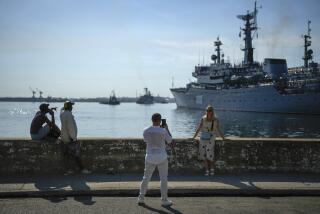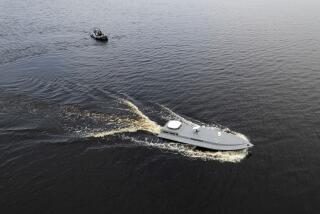Sinking Wages Unmoor Black Sea Sailors : Republics: Members of former Soviet navy say they’re raising Russian colors because Ukrainian pay is all but worthless.
SEVASTOPOL, Ukraine — With 30 members of his crew standing at attention, Capt. Igor Emshin watched the Russian ensign, a blue cross on a white field, hoisted over his Black Sea Fleet ship Sunday.
In most navies, raising your national symbol is unremarkable. But here in Sevastopol, where the Russian ensign is forbidden, the action is tantamount to mutiny against the Ukrainian government.
The 37-year-old captain and 161 other ship commanders like him have ignored Ukraine’s orders and hoisted the St. Andrew’s Cross as an act of defiance prompted, they say, by falling wages that threaten their already low standard of living and by fear of an uncertain future in a Ukrainian navy.
“By our raising the Russian ensign, this shows we want to be part of Russia,” the captain said.
The dispute that has flared up over the fleet threatens not only the future of the 20,000 pro-Russian officers and senior seamen of the Black Sea Fleet but also relations between Russia and Ukraine.
The mounting mutiny is aggravating existing tension between the two former Soviet republics over ownership of the fleet and heightening political conflict over control of Sevastopol, the fleet’s home base, and the strategically important Crimean Peninsula.
The dispute, although it has a powerful political edge, centers on money. All crews of the Black Sea Fleet are paid in Ukrainian currency--karbovanets--whose value against the Russian ruble has fallen steadily since independence in December, 1991.
“We are in an economic struggle, a fight for normal wages. I earn 8,000 coupons a month (less than $3). You cannot raise a family on that,” said sailor Valentin Blinov.
The protest has embarrassed Ukraine and provided ammunition to pro-Russia officers associations that support Moscow’s claim to the fleet.
After a year of seeing their wages shrink, crews from ships belonging to the 16th Naval Brigade began to hoist the Russian ensign 10 days ago. Reaction from Kiev, Ukraine’s capital, was swift. Defense Minister Konstantin Morozov issued military Decree No. 103, holding back funds for vessels flying the Russian ensign.
But the decree only hardened sailors’ resolve. As of Sunday, 162 ships had hoisted the St. Andrew’s Cross.
“The dispute for us is not only about money,” said Emshin, who has served 20 years in the fleet. “I want to know what the status of the fleet is going to be. I want to know about the question of citizenship.”
Ukraine’s naval commanders are furious about what they see as Moscow’s manipulation of the seamen and the “false” propaganda that has been spread. Stories abound about the hefty salaries and benefits of Russian sailors serving elsewhere.
Rear Adm. Nikolai Kostrov, deputy commander at Ukrainian fleet headquarters, denounced Russian claims of better pay as merely “lies and simple distortion.”
When the Russian and Ukrainian leaders, Boris N. Yeltsin and Leonid Kravchuk, met at Yalta last summer, they agreed to hold the fleet under joint command until 1995. However, Kostrov said, the Black Sea Command continues to take orders directly from Moscow, and relations between the Ukrainian command here and the fleet’s Russian-dominated command are nonexistent.
At the heart of this two-year dispute lies the future not only of the fleet but also of the city of Sevastopol and the Crimean Peninsula. The wrangling excites high emotions in Russia because, although Crimea was ceded to Ukraine by Soviet leader Nikita S. Khrushchev in 1954, Russians still believe that the fleet and the peninsula belong to Moscow.
More to Read
Sign up for Essential California
The most important California stories and recommendations in your inbox every morning.
You may occasionally receive promotional content from the Los Angeles Times.










